In this post, I will show you the steps to fix error code 0xc0000001 on Windows 11. I have experienced this error myself on a Windows 11 Enterprise laptop after multiple abrupt shutdowns during a power cut. The next morning, instead of booting normally, the device showed a blue recovery screen similar to the screenshot below with the error:
- Your PC could not turn off properly
- The operating system on your PC failed to turn off properly and needs to be repaired
- Error code: 0xc0000001
With options like:
- Press Enter to try again
- Press F1 to enter Recovery Environment
- Press F8 for Startup Settings
- Press Esc for UEFI Firmware Settings
Simply restarting the laptop kept bringing me back to the same blue screen. In my case, I was able to fix it by booting into Safe Mode via Startup Settings, then restarting Windows normally and running health checks on the system files and disk. In this guide I will walk through that method and several additional fixes you can try if Safe Mode alone does not resolve the issue.
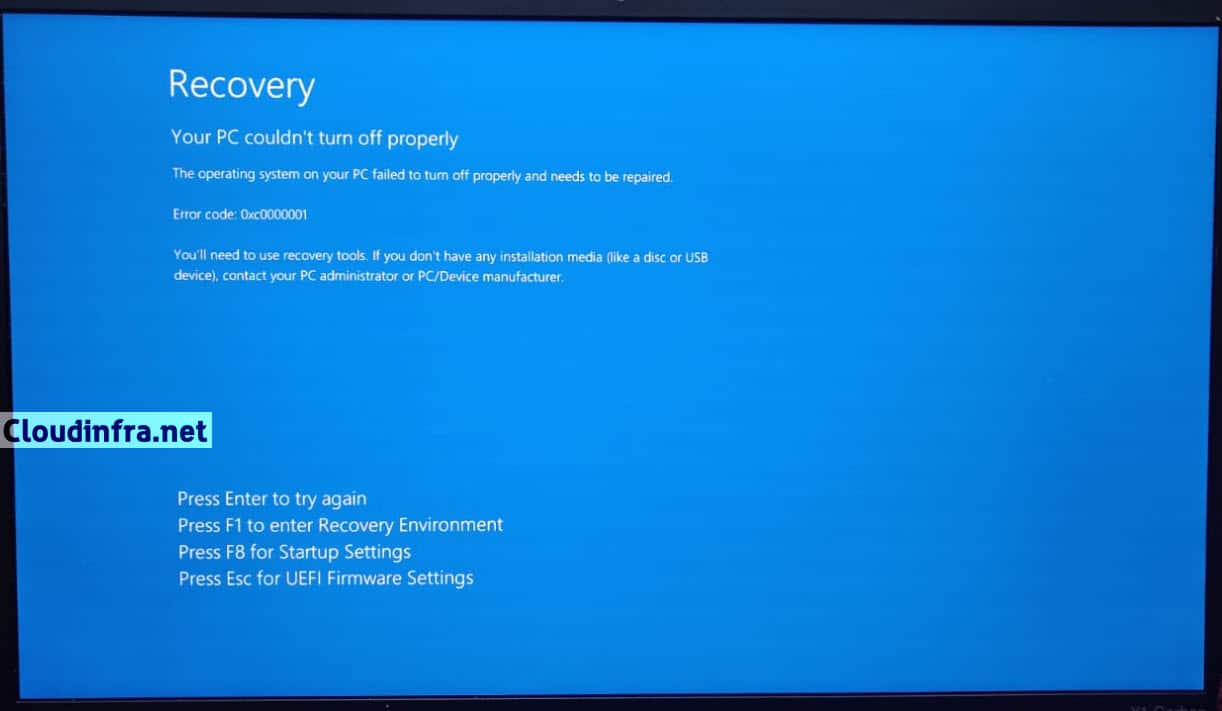
Contents
What causes error code 0xc0000001 on Windows 11?
Error 0xc0000001 is a generic boot error that typically appears with a recovery screen. Common causes include:
- The operating system did not shut down correctly (power loss, forced shutdown, drained battery).
- Corrupted system files or boot configuration (for example,
winload.efior the BCD store). - Disk or file system errors on the system drive.
- Recent driver, firmware, or Windows update that did not complete cleanly.
The exact wording on your recovery screen matters. This guide focuses mainly on the variant that says the operating system failed to turn off properly, but the additional fixes given below can also help with other 0xc0000001 boot scenarios.
Before you start
Before trying the fixes, keep these points in mind:
- BitLocker recovery key: If your system drive is protected by BitLocker, you may be asked to enter the recovery key when you go into Startup Settings or the Windows Recovery Environment (WinRE). You can retrieve the key from your Microsoft account using https://aka.ms/myrecoverykey or from your admin/tenant.
- External devices: Disconnect unnecessary USB devices (external drives, docks, printers, etc.) and try booting again. Faulty or conflicting devices can sometimes trigger boot issues.
- Backup if you can: If you manage to boot into Windows at any stage, back up important data before you make deeper changes like BCD repair or disk checks.
- Admin rights: Commands like
sfc,chkdskand boot repair require an elevated Command Prompt (Run as administrator).
Fix 1: Boot into Safe Mode and then Restart Windows
This is the method that fixed the issue on my Windows 11 laptop when the error text was The operating system on your PC failed to turn off properly and needs to be repaired. Therefore, you will have to get into safe mode and perform a clean restart.
- On the Recovery screen, choose F8 to show Startup Settings.
- If BitLocker is enabled, you will be asked to enter the BitLocker recovery key. Get it from https://aka.ms/myrecoverykey and type it in to unlock the drive.
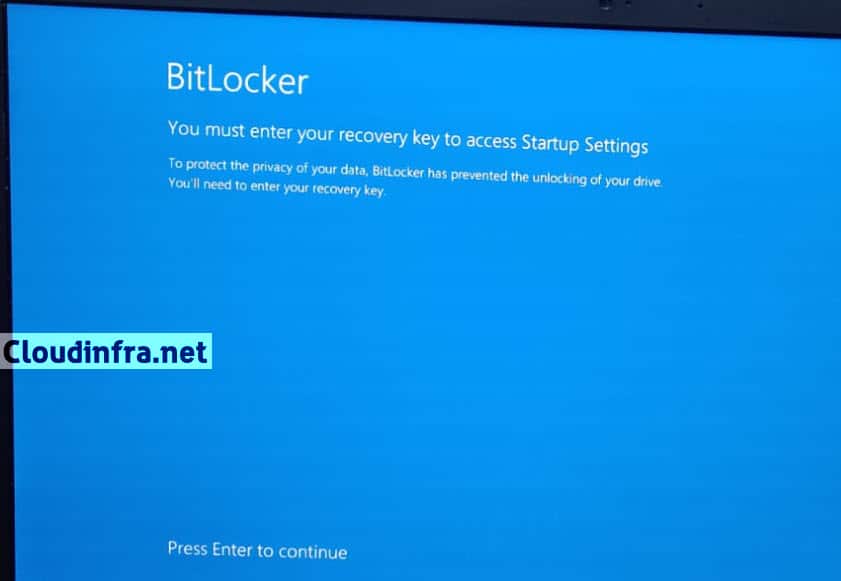
- Enter the Bitlocker recovery key.
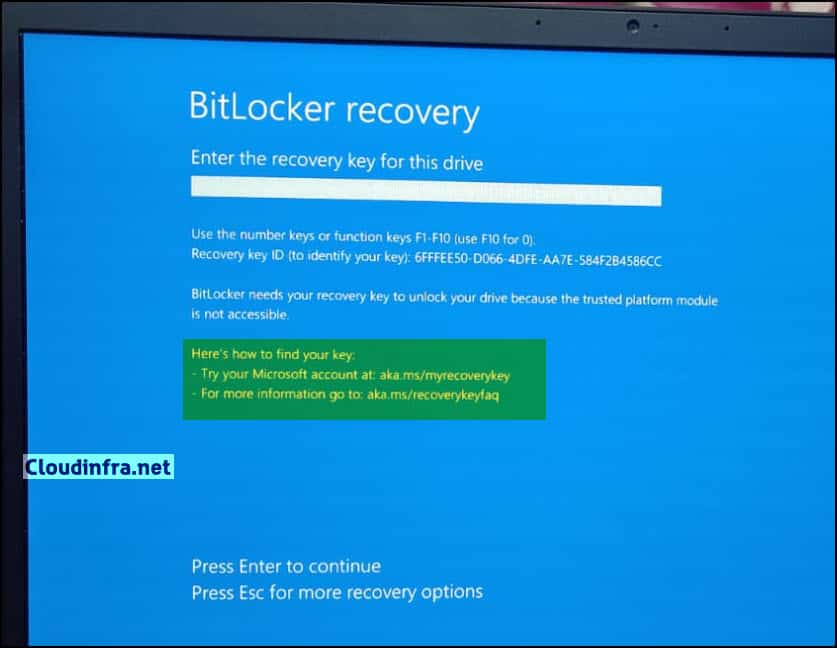
- When you see Startup Settings, press F4 to enable Safe Mode.
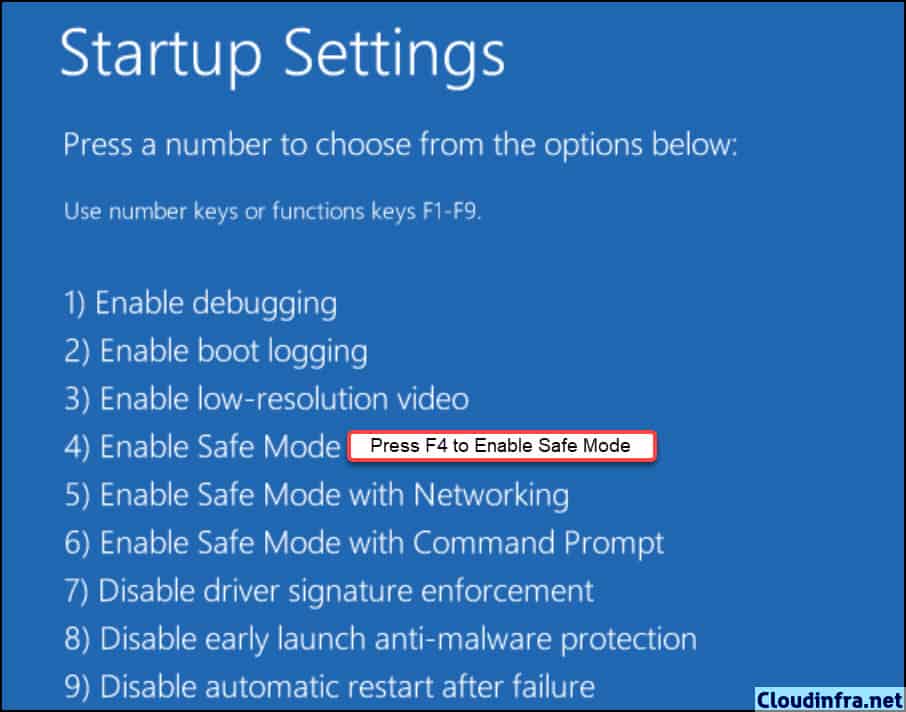
- Windows will reboot and attempt to load in Safe Mode.
- Once you are on the Safe Mode desktop, select Start > Power > Restart to restart the PC normally.
In my case, Windows booted normally after this restart, and the 0xc0000001 Recovery screen did not appear again. Even if this works for you, you should still run the health checks shown later to make sure there is no damage to system files or the disk.
Fix 2: Run Startup Repair from WinRE
If Safe Mode does not work, or you cannot reach the desktop at all, use Startup Repair from WinRE. You can enter WinRE in two ways:
Option A: From the Recovery screen
If your Recovery screen offers F1 – Recovery Environment, press it. If that does not work (loops back to the same screen), use Option B.
Option B: Force WinRE using power interrupts
- Hold the power button until the PC turns off.
- Turn it on, and as soon as Windows starts loading, hold the power button to turn it off again.
- Repeat this 3 times. On the next boot, Windows should show Preparing Automatic Repair and then Advanced options.
Then:
- On the Choose an option screen, select Troubleshoot.
- Select Advanced options > Startup Repair.
- Choose your Windows 11 installation and sign in if prompted.
- Let Startup Repair complete and then restart the PC.
If Startup Repair finds and fixes boot issues, Windows should start without the 0xc0000001 error.
Fix 3: Use System Restore or Uninstall Last Update
If you started seeing 0xc0000001 right after a Windows update, driver install, or some other change, using a restore point or uninstalling the update can help. From the Windows Recovery Environment:
- Go to Troubleshoot > Advanced options.
- Try System Restore first:
- Select System Restore.
- Select a restore point from before the error started.
- Let the restore complete and restart your PC.
- If you recently installed updates, you can also select:
- Uninstall Updates > Uninstall latest quality update, and if needed
- Uninstall latest feature update.
After the restore or uninstall, restart the device and check if Windows boots normally. You can also refer to the post Uninstall Windows Updates Using PowerShell if you want to remove the update using PowerShell.
Fix 4: Repair System Files and Disk Errors (SFC and CHKDSK)
Once you can boot back into Windows (normal mode or Safe Mode with networking), run System File Checker and Check Disk to verify there is no existing corruption.
4.1 Run System File Checker (SFC)
- Right-click on Start, and select Windows Terminal (Admin) or Command Prompt (Admin).
- Run:
sfc /scannow - Wait for the scan to reach 100 percent and review the result.
According to Microsoft, sfc /scannow scans all protected system files and replaces corrupted versions with a cached copy stored in the Windows component store. If SFC reports that it found and repaired files, restart your PC once more.
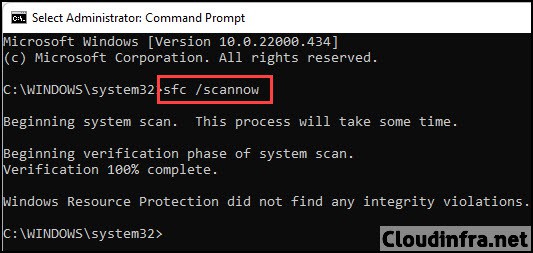
4.2 Run CHKDSK on the system drive
- In the same elevated Command Prompt, run:
chkdsk C: /f /r - If prompted to schedule the scan at the next restart, type Y and press Enter.
- Restart the PC and let CHKDSK complete.
CHKDSK checks the file system and file system metadata of a volume for logical and physical errors. With the /f and /r switches, it will attempt to fix file system issues and recover data from bad sectors. If both SFC and CHKDSK complete without errors, your system files and disk are in good shape.

Fix 5: Repair Boot files and BCD (advanced)
If you still get error 0xc0000001, especially with messages referencing \Windows\system32\winload.efi or boot configuration problems, the Boot Configuration Data (BCD) store may be damaged.
- Boot into the Windows Recovery Environment (see Fix 2).
- Go to Troubleshoot > Advanced options > Command Prompt.
- Run the following commands one by one:
bootrec /fixmbr
bootrec /fixboot
bootrec /scanos
bootrec /rebuildbcd
- When
bootrec /rebuildbcdfinds Windows installations and asks to add them to the boot list, type Y and press Enter. Close Command Prompt and restart the PC. If boot configuration was the root cause, Windows should now start without the 0xc0000001 recovery screen.
Fix 6: Reset this PC or reinstall Windows (last resort)
If none of the above fixes work and you still cannot boot:
- Boot into WinRE. Select Troubleshoot > Reset this PC.
- Choose:
- Keep my files (keeps user data but removes apps and settings), or
- Remove everything (full wipe).
You can also boot from Windows 11 installation media and perform a repair install or clean install. Use this only as a last resort, and make sure you have backed up anything important if possible. For a step-by-step guide on how to reset a Windows 11 PC, refer to the post How To Factory Reset A Windows 11 PC.
